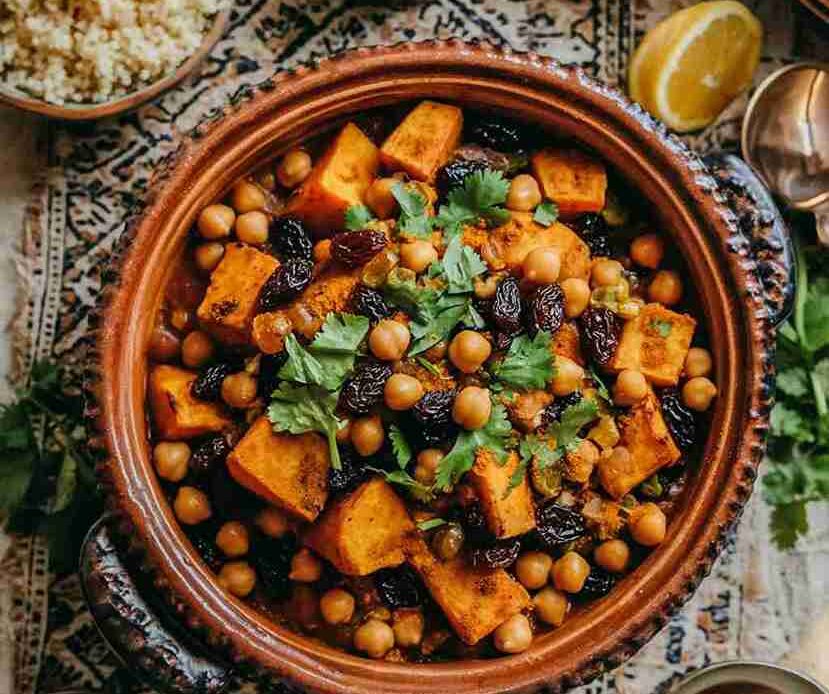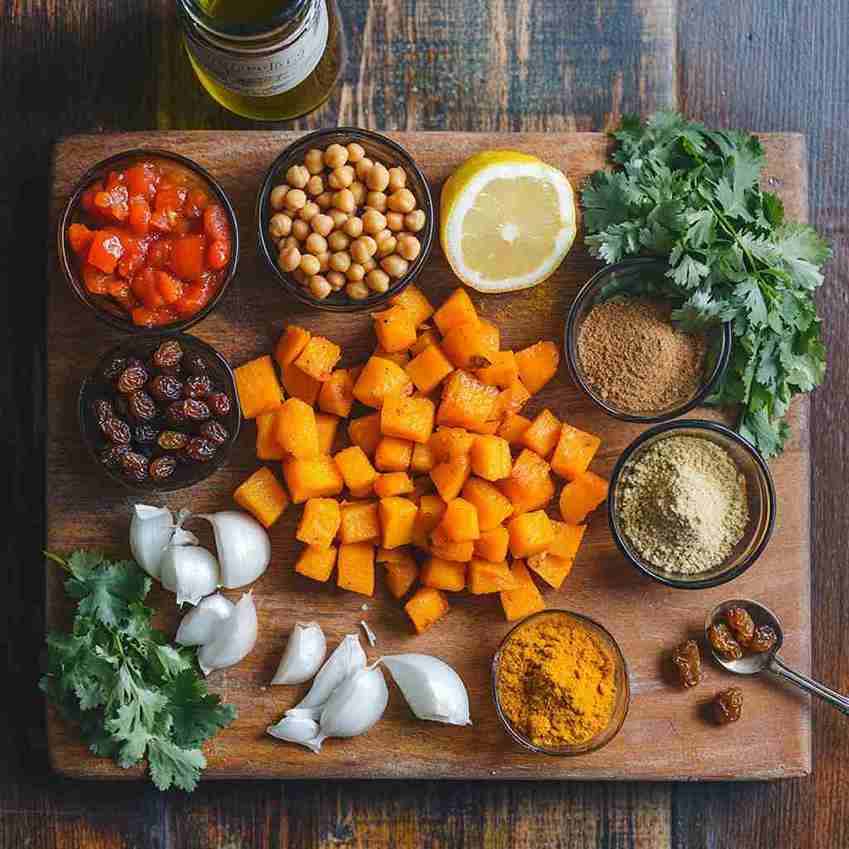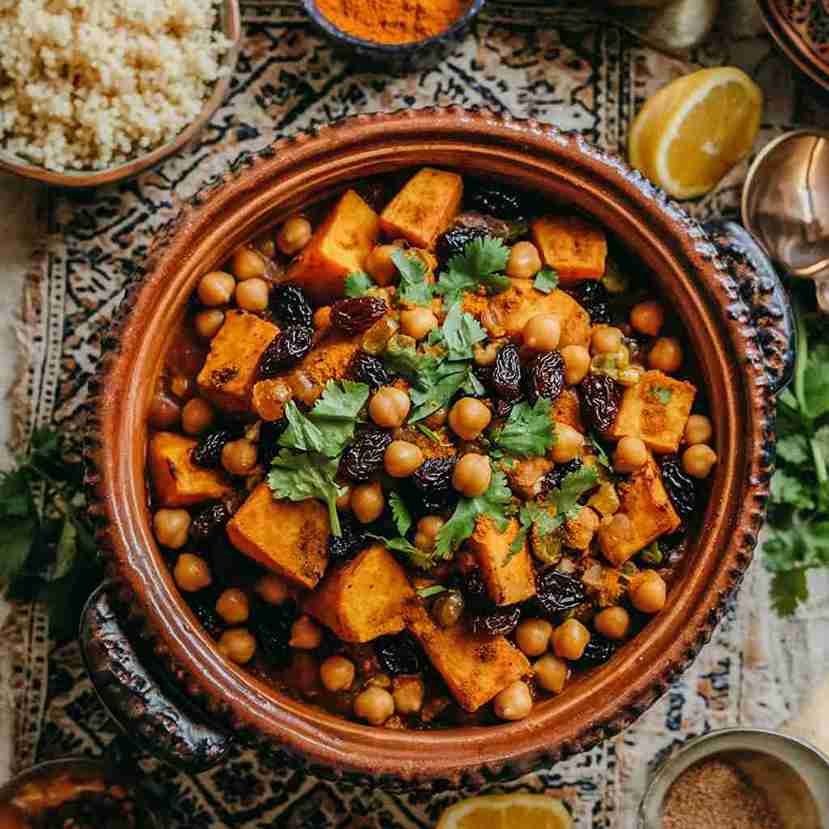
Introduction
Moroccan cuisine is famous worldwide for its tasty peculiarities, diversification, and richness of the spice palette. Among them, Moroccan Vegan Tajine could be mentioned because it is frequently used in various ways. It is an easier form of cooking because sweet potatoes sweeten it, and you don’t get complaints of a sour taste from the raisins.
Table of Contents
A Brief History of the Tajine
The tajine, named after the distinct, conical clay pot used for its preparation, is a testament to the centuries-old cooking traditions in Morocco. This vessel acts as a slow cooker and infuses each dish with flavors that develop and deepen over time. While many think of tajine as synonymous with lamb or chicken, the Moroccan Vegan Tajine is a celebration of the bounty of vegetables, legumes, and spices that make up the heart of Moroccan plant-based cuisine.
The Allure of Sweet Potatoes and Raisins in Moroccan Cuisine
This vegetable’s creamy texture and intrinsic sugars make it suitable for several modern twists on Moroccan Vegan Tajine. Together with raisins, which provide short, sudden jolts of sweetness, they form a homely, smooth, and highly satisfying pair. Unlike processed or junk foods that have become the order of the day, these ingredients satisfy not only the tongue but are also a Beldi cooking style, which means a traditional, healthy one.
Key Ingredients and Their Benefits
- Sweet Potatoes: are known for their high beta-carotene concentration and a nutritional powerhouse. They lend the dish a subtle sweetness and velvety texture that pairs beautifully with aromatic spices.
- Raisins: When simmered with spices, these dried fruits bring a touch of natural sweetness and unexpected complexity. Packed with iron and antioxidants, raisins are more than just a garnish; they are a source of vital nutrients.
- Chickpeas: Often added to enhance the protein content, chickpeas give a satisfying, hearty texture. They are high in fiber and essential for creating a balanced Moroccan Vegan Tajine.
- Spices: Cumin, coriander, cinnamon, and turmeric are the cornerstones of this dish. Each plays a unique role, from adding warmth to introducing an earthy undertone. Combining these spices results in a symphony of tastes that transports you to Marrakesh’s busy souks.
- Preserved Lemons: While optional, preserved lemons add a tangy, fermented flavor that complements the sweetness of the potatoes and raisins.
- Vegetable Broth: This base ties all the ingredients together, allowing the flavors to meld during the slow cooking process.
Essential Tools for a Perfect Tajine
Creating an authentic Moroccan vegan Tajine requires using the traditional Tajine pot. The unique shape of the tajine lid allows condensation to form, basting the dish as it cooks and infusing it with moisture. If a tajine pot isn’t available, a heavy-bottomed Dutch oven or a deep pan with a tight-fitting lid will suffice.

Ingredients:
- 2 large sweet potatoes, peeled and cut into chunks
- 1 cup chickpeas, cooked or canned (rinsed and drained)
- ½ cup raisins
- 1 large onion, finely chopped
- 3 cloves garlic, minced
- 2 tomatoes, diced
- 1 tsp ground cumin
- 1 tsp ground cinnamon
- ½ tsp ground coriander
- ½ tsp turmeric powder
- 2 tbsp olive oil
- 2 cups vegetable broth
- Salt and freshly ground black pepper to taste.
- Fresh cilantro or parsley for garnish
- Optional: 1 preserved lemon, thinly sliced
Step-by-Step Recipe for Moroccan Vegan Tajine with Sweet Potatoes and Raisins
Instructions:
- Preparation of the Base:
- Heat olive oil in a tajine pot over medium heat. If using a Dutch oven or deep skillet, ensure it’s well-preheated before adding the oil.
- Add the chopped onion and sauté for 4-5 minutes until translucent. Stir in the minced garlic and cook for an additional minute.
- Building the Flavors:
- Add the diced tomatoes and cook until they break down about 5 minutes.
- Sprinkle cumin, coriander, cinnamon, and turmeric in the ground. Stir well to coat the onion-tomato mixture with the spices. The aroma will be rich and fragrant, signaling that the spices are activated.
- Incorporating Main Ingredients:
- Gently add the sweet potatoes and chickpeas, mixing them with the spiced base.
- Pour the vegetable broth over the mixture, ensuring the sweet potatoes are partially submerged.
- Scatter the raisins and preserved lemon slices (if using) on top. Season with salt and black pepper.
- Slow-Cooking:
- Cover the tajine pot with its lid and reduce the heat to low. Allow it to simmer for 35-40 minutes, checking occasionally to ensure the liquid hasn’t evaporated. If needed, add a small amount of water or broth.
- The meal is finished when the sweet potatoes are soft and the liquid has thickened significantly.
- Finishing Touches:
- Garnish with freshly chopped cilantro or parsley for a burst of color and freshness. Serve hot with a side of warm, crusty bread or fluffy couscous.
Nutrition Facts (Per Serving)
| Calories: 320 kcal Protein: 7g Carbohydrates: 55g Sugars: 15g |
Tips for Perfecting Your Moroccan Vegan Tajine
Choosing the Right Sweet Potatoes: Choose firm, slightly less sweet varieties for a balanced dish that doesn’t overpower the spices.
Customizing with Vegetables: Add carrots, zucchini, or bell peppers to diversify the flavors and textures of your Moroccan Vegan Tajine.
Marinating the Ingredients: For an enhanced depth of flavor, marinate the sweet potatoes and chickpeas in the spice blend for 30 minutes before cooking.
Low and Slow Cooking: The key to an authentic tajine lies in its slow cooking method. This allows the flavors to deepen and meld together harmoniously.
Nutritional Profile and Health Benefits
This Moroccan Vegan Tajine isn’t just delicious; it’s a nutritional powerhouse. Sweet potatoes, rich in complex carbohydrates, provide a slow release of energy. Chickpeas, a great source of protein, make the dish filling and suitable for vegans seeking plant-based protein sources. The combination of spices also boasts anti-inflammatory and digestive benefits. Cinnamon and turmeric, in particular, have been studied for their antioxidant properties, making this dish not only flavorful but also health-conscious and satisfying.
Raisins, often overlooked as mere sweeteners, are loaded with essential nutrients like potassium and fiber. Their presence in this dish adds sweetness and a chewy texture that contrasts beautifully with the tenderness of the sweet potatoes.
The Cultural Importance of Shared Meals
In Moroccan culture, sharing a meal symbolizes hospitality and unity. The Moroccan Vegan Tajine can be a centerpiece for gatherings, embodying the spirit of (baraka), or blessings that come with communal eating. The act of dipping bread into the tajine, exchanging stories, and enjoying the layered flavors reflects the warmth and connectivity of Moroccan traditions.
Pairing and Serving Suggestions
While the Moroccan Vegan Tajine is undoubtedly a star on its own, pairing it with complementary sides can elevate your dining experience:
Couscous: Light and fluffy couscous absorbs the rich sauce and enhances the dish’s flavors.
Moroccan Bread (Khobz): Traditional Moroccan bread is ideal for scooping up the tajine’s ingredients, providing a satisfying, rustic touch.
Mint Tea: A pot of fresh Moroccan mint tea pairs beautifully with this dish, offering a refreshing balance to the spices and sweetness.
A Modern Take on Tradition
While the Moroccan Vegan Tajine with sweet potatoes and raisins holds true to the essence of Moroccan cuisine, it also offers a fresh take on traditional dishes. The simplicity of its preparation and the use of familiar ingredients make it accessible for both experienced cooks and those new to North African cooking. Whether you’re seeking a nourishing weeknight meal or a dish to impress guests, this tajine promises to be a showstopper that encapsulates the soul of Morocco in each mouthful.
Conclusion
The Moroccan Vegan Tajine with sweet potatoes and raisins embraces the spirit of Moroccan cuisine, but it also gives a fresh touch on traditional dishes. Its ease of preparation and use of common ingredients make it suitable for both seasoned cooks and those new to North African cuisine. Whether you’re looking for a filling weekday supper or a dish to amaze visitors, this tajine will be a showpiece that captures the essence of Morocco in each bite.



